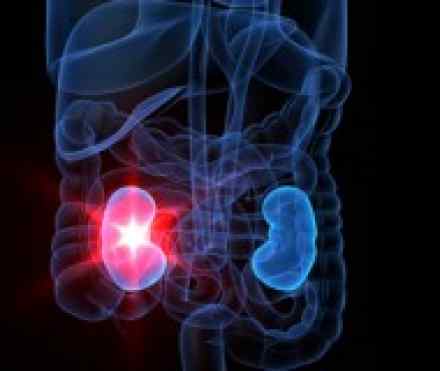
What is it?
Acute kidney failure is the sudden loss of your kidneys' ability to perform their main function of eliminating excess fluid and salts (electrolytes) as well as waste material from your blood. When your kidneys lose their filtering ability, dangerous levels of fluid, electrolytes and wastes accumulate in your body.
Acute kidney failure, which is also called acute kidney injury, develops rapidly over a few hours or a few days. Acute kidney failure is most common in people who are already hospitalised, particularly in critically ill people who need intensive care.
Acute kidney failure can be fatal and requires intensive treatment. However, acute kidney failure may be reversible. If you're otherwise in good health, you may recover normal kidney function.
Symptoms
Signs and symptoms of acute kidney failure may include:
-
Decreased urine output, although occasionally urine output remains normal
Fluid retention, causing swelling in your legs, ankles or feet
Drowsiness
Shortness of breath
Confusion
Nausea
Seizures or coma in severe cases
Chest pain or pressure
Sometimes acute kidney failure causes no signs or symptoms and is detected through laboratory tests done for another reason.
What causes it?
Acute kidney failure occurs when your kidneys suddenly become unable to filter wastes from your blood. Acute kidney failure can occur when something damages your kidneys, or it can occur when another condition slows blood flow to your kidneys. Acute kidney failure can also occur when the wastes filtered by your kidneys aren't able to leave your body through your urine.
Diseases and conditions that may slow blood flow to the kidneys and can lead to kidney failure include:
-
Blood loss
-
Blood pressure medications
-
Infection
-
Nonsteroidal anti-inflammatory drugs, such as aspirin, ibuprofen and naproxen
-
Severe allergic reaction (anaphylaxis)
-
Severe burns
-
Severe dehydration
Diseases and conditions that damage the kidneys and may lead to acute kidney failure include:
-
Blood clots in the veins and arteries in and around the kidneys
-
Cholesterol deposits that block blood flow in the kidneys
-
Glomerulonephritis
-
Hemolytic uremic syndrome
-
Infection
-
Medications, such as certain chemotherapy drugs, antibiotics and dyes used during imaging tests
-
Scleroderma
-
Thrombotic thrombocytopenic purpura
-
Toxins, such as alcohol, heavy metals and cocaine
Diseases and conditions that block the passage of urine out of the body (urinary obstructions) and can lead to acute kidney failure include:
-
Bladder cancer
-
Blood clots in the urinary tract
-
Cervical cancer
-
Colon cancer
-
Enlarged prostate
-
Nerve damage involving the nerves that control the bladder
Risk factors
Acute kidney failure almost always occurs in connection with another medical condition or event. Conditions that increase your risk of acute kidney failure include:
-
Being hospitalized, especially for a serious condition that requires intensive care
-
Advanced age
-
Blockages in the blood vessels in your arms or legs (peripheral artery disease)
Treatments available
Treatment for acute kidney failure typically requires a hospital stay. Most people with acute kidney failure are already hospitalized. How long you'll stay in the hospital depends on the reason for your acute kidney failure and how quickly your kidneys recover.
Treating the underlying cause of your kidney failure
Treatment for acute kidney failure involves identifying the illness or injury that originally damaged your kidneys. Your treatment options will depend on what's causing your kidney failure.
Treating complications until your kidneys recover
Your doctor will also work to prevent complications and allow your kidneys time to heal. Treatments that help prevent complications include:
-
Treatments to balance the amount of fluids in your blood. Acute kidney failure is sometimes caused by a lack of fluids in your blood. In this case, your doctor may recommend intravenous fluids. In other cases, acute kidney failure may cause you to have too much body fluid, leading to swelling in your arms and legs. In these cases, your doctor may recommend medications (diuretics) to cause your body to expel extra fluids.
-
Medications to control blood potassium. If your kidneys aren't properly filtering potassium from your blood, your doctor may prescribe calcium, glucose or sodium polystyrene sulfonate (Kayexalate) to prevent the accumulation of high levels of potassium in your blood. Too much potassium in the blood can cause dangerous irregular heartbeats (arrhythmias).
-
Medications to restore blood calcium levels. If the levels of calcium in your blood drop too low, your doctor may recommend an infusion of calcium.
-
Dialysis to remove toxins from your blood. If toxins build up in your blood, you may need to undergo temporary hemodialysis — often referred to simply as dialysis — to help remove toxins and excess fluids from your body while your kidneys heal. Dialysis may also help remove excess potassium from your body. During dialysis, a machine pumps blood out of your body through an artificial kidney (dialyzer) that filters out waste. The blood is then returned to your body.
Lifestyle solutions
During your recovery from acute kidney failure, your doctor may recommend a special diet to help support your kidneys and limit the work they must do. Your doctor may refer you to a dietitian who can analyze your current diet and suggest ways to make your diet easier on your kidneys.
Depending on your situation, your dietitian may recommend that you:
Choose lower potassium foods. Your dietitian may recommend that you choose lower potassium foods at each meal. High-potassium foods include bananas, oranges, potatoes, spinach and tomatoes. Low-potassium foods include apples, cabbage, carrots, green beans, grapes and strawberries.
Avoid products with added salt. Lower the amount of sodium you eat each day by avoiding products with added salt, including many convenience foods, such as frozen dinners, canned soups and fast foods. Other foods with added salt include salty snack foods, canned vegetables, and processed meats and cheeses.
Prevention
Acute kidney failure is often impossible to predict or prevent. But you may reduce your risk by taking care of your kidneys. Try to:
-
Follow instructions on over-the-counter medications. Follow the instructions on OTC pain medications such as aspirin, paracetamol and ibuprofen. Taking doses that are too high may increase your risk of acute kidney failure.
-
Work with your doctor to manage kidney problems. If you have kidney disease or other diseases or conditions that increase your risk of acute kidney failure, follow your doctor's recommendations for managing your chronic conditions.
References:
http://www.nlm.nih.gov/medlineplus/ency/article/000501.htm
http://en.wikipedia.org/wiki/Acute_kidney_injury
http://www.mayoclinic.com/health/kidney-failure/DS00280
http://www.webmd.com/a-to-z-guides/acute-renal-failure-topic-overview
http://edition.cnn.com/HEALTH/library/kidney-failure/DS00280.html
http://www.emedicinehealth.com/acute_kidney_failure/article_em.htm
http://www.davita.com/kidney-disease/kidney-failure/acute-renal-failure
http://www.patient.co.uk/doctor/acute-kidney-injury


